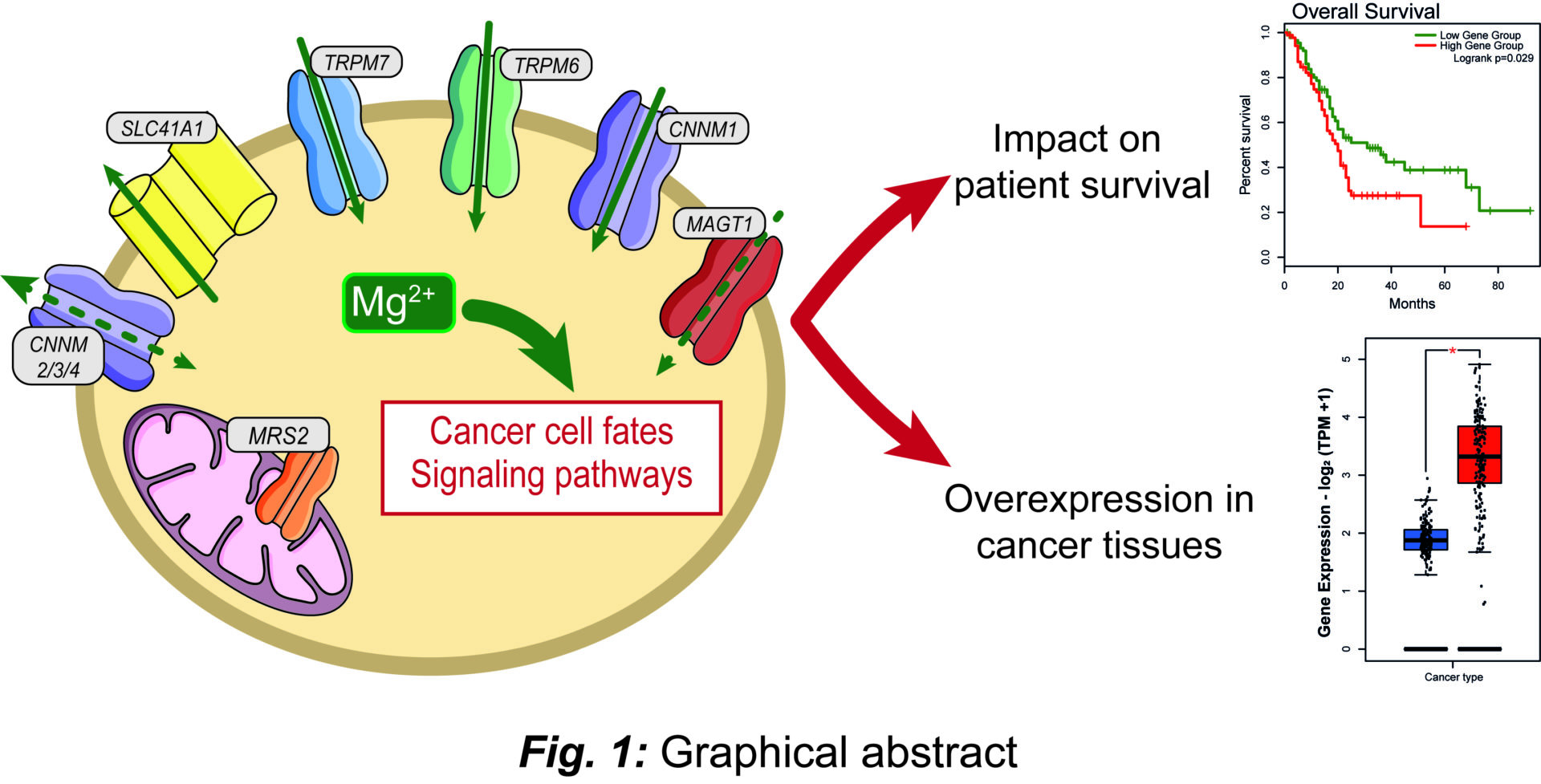Introduction: Digestive cancers are the most frequent and lethal cancers in the world [1]. Many epidemiological studies suggest that a bad diet and lifestyle could increase the risk of developing digestive cancer [2-4]. It is shown notably that magnesium (Mg2+) intake decreases over the years and could be linked to the incidence of some digestive cancers, like pancreatic cancer [5]. Mg2+ is essential for cellular physiology, as it regulates a lot of cellular processes. Its homeostasis is regulated by membrane transporters, such as TRPM6, TRPM7, MAGT1, CNNM4, SLC41A1, and MRS2. However, their distribution in tissues from digestive cancers has not been exhaustively studied. Aim: This work aims to study Mg2+ transporter expression in digestive cancers and their impact on patient survival. Methods: We analyzed the Mg2+ transporters TRPM6, TRPM7, MAGT1, CNNM1-4, SLC41A1, and MRS2 mRNA relative expression from the TCGA transcriptomic datasets to investigate their expression pattern, combinatory correlation, and their impact on survival in esophageal carcinoma (ESCA), stomach adenocarcinoma (STAD), pancreatic adenocarcinoma (PAAD) and colorectal adenocarcinoma (COADREAD). Genotype Tissue Expression (GTEx) and Cancer Genome Atlas (TCGA) datasets were analyzed in this study, using GEPIA2 and RStudio tools. Results: By comparing non-tumoral and tumoral tissues, we observed an alteration of Mg2+ transporters expression in most of digestive cancers. MAGT1 and CNNM4 are overexpressed in all digestive cancers (p < 0.01) and are negatively correlated with overall-survival and in disease-free in PAAD patients (p < 0.05; n = 171). High TRPM6 was correlated with a better outcome in those patients (p < 0.01). Interestingly, we identified a gene signature involving MAGT1, CNNM4 and TRPM7 (0.19 < R < 0.16 for ESCA; 0.2 < R < 0.27 for PAAD, p < 0.01). This signature is associated with poor prognosis in some digestive cancers, like PAAD (p < 0.001; n = 176), ESCA (p < 0.001; n = 184) or COADREAD (p < 0.001; n = 466). Conclusion: Our work suggests the importance of Mg2+ transporters such as MAGT1, TRPM7, and CNNM4 as potential new biomarkers in digestive cancers. More analyses are required to evaluate the functional interaction among those proteins and their impact on cancer processes such as cell proliferation, migration, or invasion.
Future Physiology 2021 (Virutal) (2021) Proc Physiol Soc 47, PC25
Poster Communications: MAGNESIUM TRANSPORTERS EXPRESSION AND PROGNOSTIC IMPACT IN DIGESTIVE CANCERS
Julie Auwercx1, Pierre Rybarczyk1, 2, Philippe Kischel1, Isabelle Dhennin-Duthille1, Denis Chatelain2, Henri Sevestre1, 2, Isabelle Van Seuningen3, Halima Ouadid-Ahidouch1, Nicolas Jonckheere3, Mathieu Gautier1
1 Université de Picardie Jules Verne, UFR des Sciences, UR-UPJV 4667, F-80000 Amiens, France 2 Service d’Anatomie et Cytologie Pathologique, CHU Amiens-Picardie, F-80000 Amiens, France 3 Univ. Lille, CNRS, Inserm, CHU Lille, UMR9020-U1277—CANTHER—Cancer Heterogeneity Plasticity and Resistance to Therapies, F-59000 Lille, France
View other abstracts by:
Where applicable, experiments conform with Society ethical requirements.

